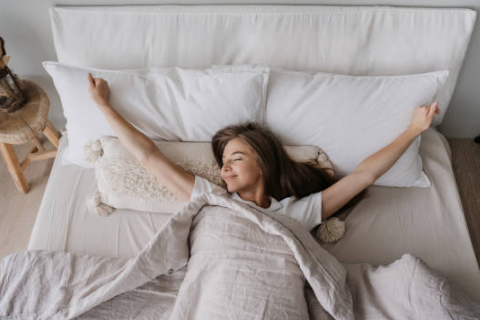Nothing beats a good night’s sleep, but for many, it’s hard to get. Science increasingly shows that skipping quality sleep can damage health—raising the risk of heart disease, kidney problems, diabetes, and depression.
While sleep quality isn’t entirely within your control, factors like your daytime routine and how you wind down at night can help you sleep deeper and longer. What you eat can also play a role: some foods and drinks are rich in melatonin and tryptophan, nutrients that may promote rest and better sleep.
No single food will guarantee you sleep through the night, but trying these nutrient-packed sleep-supporting options carries little risk and may improve rest.

1. Turkey
Turkey is famously linked to post-Thanksgiving fatigue—and it’s not just the holiday binge. It’s high in tryptophan, an amino acid that boosts serotonin, which then turns into melatonin. These brain chemicals regulate mood and sleep cycles.
Low tryptophan intake is linked to difficulty falling and staying asleep. While supplements exist, food sources are preferable. Try turkey slices with hummus and crackers or turkey chili with sweet potatoes as a pre-bedtime snack.
Other good tryptophan sources include:
-
Egg whites
-
Milk
-
Chicken
-
Cheese
-
Fish
-
Soy
-
Peanuts
-
Seeds (especially pumpkin, sesame, and sunflower seeds)
Pair tryptophan-rich foods with healthy carbs like crackers or sweet potatoes to help the amino acid reach your brain and promote sleep.
2. Kiwi
Kiwi is naturally packed with serotonin, which helps increase melatonin production in the brain. Beyond sleep benefits, kiwi offers fiber and immune-supporting vitamin C and may aid in relieving constipation when eating two daily.
3. Tart Cherry Juice
Tart cherry juice is well-known for its sleep-promoting properties. It’s featured in drinks like the “Snooze-Girl Mocktail” (tart cherry juice, magnesium powder, and soda)—designed to relax and help you sleep. Tart cherries (like Montmorency cherries) contain natural melatonin and some tryptophan.
Choose unsweetened juice to avoid added sugar, which can make you feel more alert and disrupt sleep. Whole tart cherries are an option too, though they’re less commonly available fresh and most research focuses on the juice.
If you’re on medication, consult your healthcare provider before adding tart cherry juice or supplements to your routine, as natural melatonin can interact with some drugs.
4. Fatty Fish
Healthy unsaturated fats—like omega-3s found in fatty fish—may help improve sleep quality. Studies link a Mediterranean-style diet (high in fatty fish) to better sleep.
Try eating fatty fish 2–3 times weekly. Salmon, sardines, Atlantic mackerel, and Pacific mackerel offer anti-inflammatory omega-3s and vitamin D, both associated with improved sleep.

5. High-Fiber Foods
While a big salad may not be the most obvious sleep food, a healthy gut strongly relates to better sleep. A diverse gut microbiome supports sleep, and fiber helps feed good gut bacteria.
Try to eat a variety of plant-based foods, including:
-
Fruits: raspberries, blackberries, pears, apples, avocados
-
Vegetables: artichokes, broccoli, sweet potatoes, kale
-
Legumes: beans, chickpeas, peas, lentils
-
Nuts: almonds, pine nuts, pistachios, chestnuts
-
Seeds: chia, flaxseed, sunflower
-
Whole grains: oats, brown rice, quinoa
Eating Strategies to Support Sleep
-
Set a caffeine cutoff: If you’re sensitive to caffeine, avoid it at least 10 hours before bedtime, as it can linger in your system and disrupt rest.
-
Limit alcohol: Alcohol can help you fall asleep faster but often leads to poorer sleep quality and more wake-ups. Stop drinking at least three hours before bed to give your body time to process it.
-
Avoid sugary foods and drinks at night: These can trigger insulin spikes and energy surges, making sleep harder. If cravings hit, reach for fruit instead.
Other Lifestyle Tips for Better Sleep
-
Keep your bedroom cool: Cooler temperatures (around 65°F/19°C) help promote deep sleep.
-
Stay on a consistent sleep schedule: Go to bed and wake up around the same time daily—even on weekends—to regulate your internal clock.
-
Dim lights in the evening: Bright lights hinder melatonin production and can shift your sleep-wake cycle. Dim lights a few hours before bed.
-
Create a calming bedroom environment: Aim for darkness, quiet, and a cool temperature. Use blackout curtains, white noise, and a thermostat set between 65–70°F (18–21°C).
-
Avoid caffeine and alcohol before bed: Both disrupt sleep patterns—even if they seem to help you fall asleep they often reduce sleep quality.

